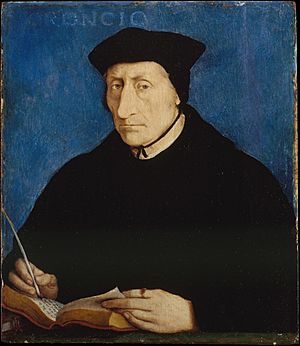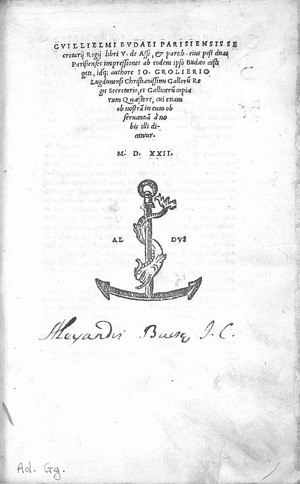Guillaume Budé facts for kids
Quick facts for kids
Guillaume Budé
|
|
|---|---|

Guillaume Budé, c. 1536 portrait by Jean Clouet
|
|
| Born | 1467 |
| Died | 1536 (aged 68–69) Paris, Kingdom of France
|
| Other names | William Budaeus |
| Alma mater | University of Orléans |
| Era | Renaissance philosophy |
| Region | Western philosophy |
| School | Renaissance humanism |
| Institutions | Collegium Trilingue |
| Academic advisors | Janus Lascaris George Hermonymus |
| Notable students | Melchior Wolmar John Colet |
|
Main interests
|
Law |
Guillaume Budé (born 1468 – died 1540) was an important French scholar and humanist. A humanist was someone who studied classical Greek and Roman texts. He played a big part in starting the Collegium Trilingue. This school later became known as the Collège de France.
Budé was also the first person to manage the royal library. This library was first at the Palace of Fontainebleau. It later moved to Paris and became the famous Bibliothèque nationale de France. He also worked as an ambassador in Rome. He held several important jobs in law and government.
Life and Studies
Guillaume Budé was born in Paris, France. He went to the University of Orléans to study law. For a few years, he lived a carefree life because he had enough money. But when he was about 24, he suddenly became very interested in studying. He quickly became very good at Latin and Ancient Greek.
His most famous work was De Asse et Partibus Eius (1514). This book was about old coins and measurements. King Francis I thought very highly of Budé. Budé convinced the king to create the Collegium Trilingue. This school taught three languages: Latin, Greek, and Hebrew. It later became the Collège de France.
Budé also helped the king start the library at Fontainebleau. This library later moved to Paris and grew into the Bibliothèque Nationale. In 1533, some people wanted to stop printing books in France. Budé convinced King Francis I not to ban printing. Earlier, King Louis XII sent Budé to Rome. He was an ambassador to Pope Leo X. In 1522, he got an important job as a royal official. He also served several times as the prévôt des marchands, which was like a mayor of Paris.
Later Life and Legacy
Guillaume Budé died in Paris. He asked to be buried at night. After his death, his wife openly followed a different Christian faith in Geneva. This made some people think Budé might have also had similar religious views.
His family had to leave France during a time of religious conflict. Some of them found safety in Switzerland. Others moved to a place called Swedish Pomerania.
Budé wrote other important books. One was Annotationes in XXIV. libros Pandectarum (1508). This book used language and history to study Roman law. It greatly changed how Roman law was understood. He also wrote Commentarii linguae Graecae (1529). This was a huge collection of notes on Greek words. It helped many people in France learn Greek literature. He also wrote many letters, some in very pure Greek.
Budé wrote to many smart people of his time. These included Erasmus, who called him the "marvel of France." He also wrote to Thomas More. Budé could write easily in both Greek and Latin.
Works
- Translations from Plutarch, from 1502 to 1505
- Annotationes in XXIV libros Pandectarum, Paris, 1508
- Annotationes in quattuor et viginti pendectarum libros. Paris, Josse Bade, 1532
- De contemptu rerum fortuitarum libri tres, Paris, 1520
- Epistolae, in 8vo, 1520
- Summaire ou Epitome du livre de Asse, Paris, 1522
- De studio litterarum recte et commode instituendo, Paris, 1527
- Commentarii linguae graecae, Paris, 1529
- Commentarii Linguae Græcae, Gulielmo Budaeo, consiliario Regio, supplicumque libellorum in Regia magistro, auctore. Ab eodem accuratè recogniti, atque amplius tertia parte aucti. Ex officina Roberti Stephani typographi Regii, Parisiis, 1548
- De philologia, Paris, 1530
- Libellorumque magistri in praetorio, altera aeditio annotationum in pandectas, Paris, Josse Bade, 1532
- De Studio Literarum Recte Et Commode Instituendo. Item Eiusdem G. Budaei De Philologia Lib. II. Basileae, apud Ioan. Walderum, martio 1533
- De transitu Hellenismi ad Christianismum libri tres, Paris, Robert Estienne, 1534
- De l'institution du prince, in-folio, 1547
- Opera omnia, 4 vol. in-folio, Basel, 1557
Family
Guillaume was the son of Jean Budé (died 1502) and Catherine Le Picart. He married Roberte Le Lieur when she was about 15 years old. Their children included:
- Dreux Budé (died 1547), who married Marthe Paillart
- François (died 1550)
See also
 In Spanish: Guillaume Budé para niños
In Spanish: Guillaume Budé para niños
 | Dorothy Vaughan |
 | Charles Henry Turner |
 | Hildrus Poindexter |
 | Henry Cecil McBay |


